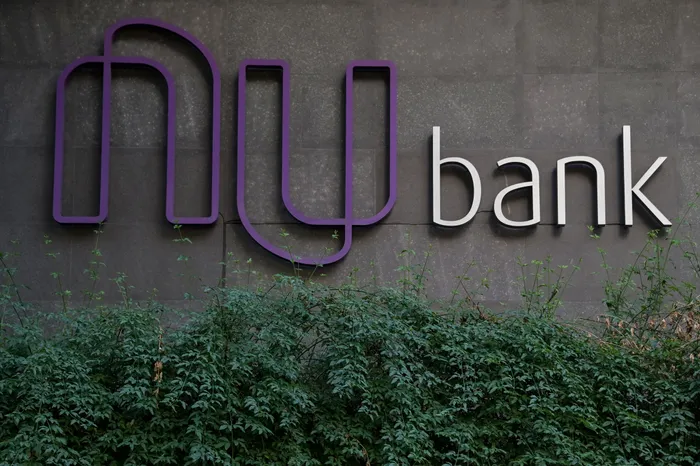
View of the logo of Brazilian FinTech startup Nubank outside its headquarters, in Sao Paulo, Brazil.
Image: AFP
Brazil, Latin America’s largest economy, is experiencing a transformative fintech boom. Once dominated by traditional and oligopolistic banking systems, the country’s financial sector is rapidly evolving to cater to the needs of its diverse population. With over 20% of the population still unbanked, fintech innovations offer a pathway to financial inclusion and efficiency.
Brazil's digital payment infrastructure continues to evolve rapidly, with the Central Bank’s Pix system firmly entrenched as the country’s dominant transaction platform. Since its 2020 debut, Pix has surpassed three billion transactions per month, becoming the preferred payment method across various use cases—from daily retail purchases to business-to-business transfers. As of 2025, around 80% of the adult population actively uses Pix, drawn by its core advantages: instant settlement, round-the-clock availability, and free peer-to-peer transfers.
Alongside Pix, other components of Brazil’s digital payments landscape are also gaining traction. The prepaid card sector, which expanded at a compound annual growth rate (CAGR) of 7.5% between 2019 and 2023, is now forecast to grow even faster—an estimated 12.9% CAGR from 2024 to 2028. This reflects growing consumer preference for flexible, bank-independent financial instruments.
Meanwhile, digital wallets such as PicPay, PagSeguro, and Mercado Pago continue to diversify the ecosystem. By 2025, one in three Brazilians regularly uses a digital wallet, not only for payments but also for a wider array of financial services. PicPay, in particular, has expanded its user base to over 62 million, offering integrated access to insurance products, investment platforms, and cryptocurrency trading, solidifying its position as a leading fintech provider.
Brazil’s marketplace lending sector continues its strong expansion. In 2024, consumer lending volumes reached approximately $57.8 million, with forecasts suggesting sustained growth amid rising demand for alternative credit solutions.
The country’s broader fintech ecosystem has matured significantly, comprising over 1,500 active startups across diverse segments such as digital payments, wealth management platforms, peer-to-peer lending, and alternative financing. This ecosystem is marked by a high collaboration index of 204%, reflecting deep integration and cooperation among firms, accelerators, and regulatory bodies.
At the forefront of this movement is Nubank, a flagship example of Brazil’s fintech success. As one of the world’s largest digital banking platforms, Nubank continues to expand its product suite—ranging from no-fee credit cards to savings, investment tools, and small business loans—reshaping how Brazilians engage with financial services.
The surge in demand for accessible, non-traditional financing channels is cementing Brazil’s reputation as a global leader in fintech innovation and financial democratisation. With strong consumer adoption and supportive regulatory frameworks, the sector is well positioned for continued acceleration through 2025 and beyond.
Brazil’s regulatory landscape has played a pivotal role in shaping its fintech ecosystem. Pix operates under the oversight of the Central Bank, which has embraced its role as a tech-forward institution. Open banking regulations in Brazil are more efficient and mandatory compared to Europe’s PSD2, fostering transparency and competition. This progressive regulatory framework supports partnerships between traditional banks and fintech startups, though challenges remain.
One significant development is the planned reduction of the IOF tax to 0% on key foreign currency and transfer-related transactions, leveling the playing field for fintech businesses. However, high taxes on essential tech goods like smartphones and computers and the requirement for all transactions to be conducted in Reais impose constraints on the industry’s growth.
The fintech revolution in Brazil is more than just a trend; it is a movement reshaping the financial fabric of the nation. From the dominance of Pix in digital payments to the proliferation of online lending platforms, fintech innovations are addressing longstanding inefficiencies and fostering inclusion. With supportive regulations and a collaborative ecosystem, Brazil is well on its way to achieving its potential as a global fintech powerhouse.
Written By:
*Dr Iqbal Survé
Past chairman of the BRICS Business Council and co-chairman of the BRICS Media Forum and the BRNN
*Cole Jackson
Lead Associate at BRICS+ Consulting Group Chinese & Brazilian Specialist
**The Views expressed do not necessarily reflect the views of Fast Company
** MORE ARTICLES ON OUR WEBSITE https://bricscg.com/
** Follow @brics_daily on X/Twitter for daily BRICS+ updates
Related Topics:
